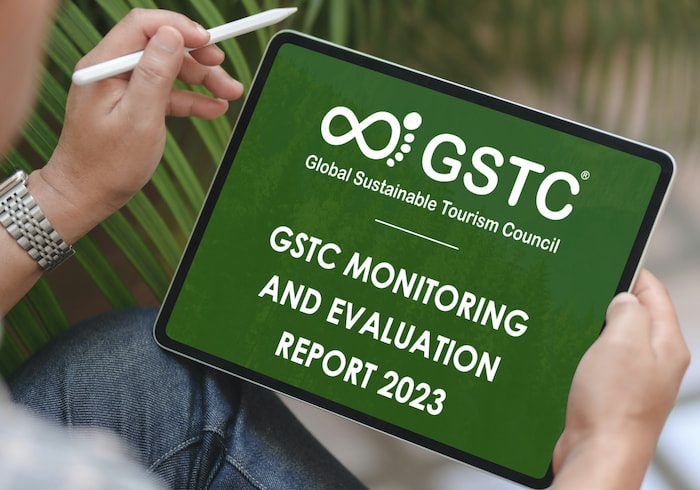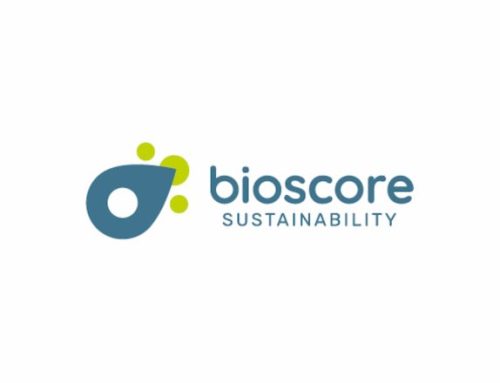
In 2023, the GSTC revised its Monitoring and Evaluation System to version 2 in order to track progress toward meeting the goals outlined in its Theory of Change. This conceptual map traces a causal pathway, linking the strategies employed (the actions taken) to the resulting outcomes (what has been changed) and the underlying assumptions of the process. GSTC’s Impact Pathways vividly illustrate these dynamic interconnections.
Its Monitoring and Evaluation System helps the GSTC evaluate and improve its effectiveness and impact in all its diverse activities and enables the GSTC to be accountable to its stakeholders and ensure credibility by providing transparent and verifiable information.
The 2023 Monitoring and Evaluation Report presents an in-depth analysis of the Global Sustainable Tourism Council’s achievements, elucidating the methodologies and insights derived from our internal assessment of the extensive implementation of the GSTC Criteria (the global standards for sustainability in travel and tourism) and the effectiveness of GSTC’s projects. Its core aim is to disseminate the indicators set for each of GSTC’s services alongside their corresponding outcomes within the year while also highlighting ongoing and forthcoming initiatives designed to enhance and improve GSTC’s outcomes and impacts.
The GSTC Monitoring and Evaluation Indicators serve as the foundation for monitoring the performance of the GSTC. The GSTC has developed a total of 102 Monitoring and Evaluation Indicators through the participation of all staff members. This report includes 33 indicators that cover the following areas: 12 for Membership and Engagement, 10 for the Sustainable Tourism Training Program, 1 for Criteria Management, 4 for the Recognition of Standards Program, 4 for Accreditation, and 2 for the Destination Program.
The 2023 Monitoring and Evaluation Report provides a detailed overview of GSTC’s activities and impacts and explores any unintended effects detected from its work. It also dedicates a section to lessons learned from 2023 and outlines an improvement plan for the future. It examines various aspects of GSTC’s operations, including membership and engagement, training initiatives (both for auditors and the public), criteria development, recognition, and accreditation, among others.
Of particular significance is the section highlighting activities that create impact, focused on last year’s collaboration between the World Travel & Tourism Council (WTTC) and GSTC. This partnership underscores the importance of collective action within the tourism industry to promote sustainability. Both organizations aim to drive positive change and foster more sustainable practices across the sector through joint efforts.
Overall, the 2023 Monitoring and Evaluation Report not only assesses GSTC’s past activities but also outlines a strategic roadmap for future endeavors, ensuring continuous progress towards sustainable tourism practices globally.
–
“The history of GSTC is one of resilience and growth. Our first activities back in 2007 were funded by the UN Foundation and supported by partners from UN bodies, prominent NGOs, and major tourism leaders from the private sector. We have been able, as our reach and relevance increased, to attain financial independence. […] This report aims at providing quantitative and qualitative information on the outputs of GSTC work. I trust that the readers will appreciate our efforts and results towards a more sustainable tourism,” says Luigi Cabrini, GSTC Chair.
“The GSTC Board of Directors, staff, and members are proud of the accomplishments we have made since our inception. During that time, we have developed and managed the GSTC Criteria as the “go-to” global standards for sustainable travel and tourism and have had many successes in supporting positive impacts from their application. […] We frequently hear reports of the indirect influence the GSTC Criteria has had on positive impacts for more sustainable forms of travel and tourism. In this report, we share our methodology and learnings based on our internal review of the widespread application of the GSTC Criteria and our programs. GSTC is a vast network of experts operating from a small, mostly virtual team. To that global network of players, we extend our deep gratitude for their commitment to a more sustainable world by engaging with our programs,” says Randy Durband, GSTC CEO.
“My heartiest congratulations to GSTC on your first annual monitoring and evaluation report. Since The Ascott Limited joined as a member in 2022, we have been honoured to have the opportunity to partner with GSTC in driving GSTC criteria adoption for the hospitality industry. Our strategic MoU in 2023 to provide training opportunities for the industry via our training arm, Ascott Centre for Excellence, in Singapore was testament to that. As a group, we have committed to achieve 100% GSTC certification by 2028. To date, five properties have been certified with more in the pipeline. By the end of this year, we expect one in five of every Ascott property in the world to be GSTC-certified, keeping on track with our 2028 commitment. In particular, we aim to achieve GSTC certification for more than 95% of our accommodation units across the Singapore portfolio,” said Beh Siew Kim, Chief Financial and Sustainability Officer, Lodging, CapitaLand Investment and Managing Director, Japan & Korea, The Ascott Limited.
“The Mauritius Standards Bureau started collaborating with GSTC some ten years back, involving several activities such as recognition of its national standard, training of auditors and accreditation as a Certification Body. This collaboration has been so enriching and today we are proud to be a GSTC-Accredited Certification Body running our own national programme. Already, our status as a GSTC-Accredited Certification Body is making an impact not only in Mauritius, but at the regional level as well. We seize this opportunity to express our warmest congratulation to GSTC for the publication of its first monitoring and evaluation report. This shows their remarkable achievements in their endeavour towards Sustainable Tourism globally. Without doubt, this is a major stepping stone in shaping the path towards worldwide Sustainable Tourism,” said the Mauritius Standards Bureau, Republic of Mauritius.
“Los Angeles Tourism recognizes that U.S. destinations currently lack a commonly accepted set of standards by which to measure their sustainability efforts – a baseline consideration in understanding where there are opportunities to meaningfully improve tourism sustainability and equity. As such, we are proud to be a GSTC member and strongly support broad adoption of GSTC’s destination sustainability framework, which is fully consistent with the U.N. SDGs. We look forward to supporting this critical work now and well into the future,” said the Los Angeles Tourism & Convention Board.
About the GSTC
The Global Sustainable Tourism Council® (GSTC®) establishes and manages global sustainable standards, known as the GSTC Criteria. There are two sets: Destination Criteria for public policy-makers and destination managers and Industry Criteria for hotels and tour operators. These are the guiding principles and minimum requirements that any tourism business or destination should aspire to reach in order to protect and sustain the world’s natural and cultural resources while ensuring tourism meets its potential as a tool for conservation and poverty alleviation.
The GSTC Criteria form the foundation for the Accreditation of Certification Bodies that certify hotels/accommodations, tour operators, and destinations as having sustainable policies and practices in place. GSTC does not directly certify any products or services; but it accredits those that do. The GSTC is an independent and neutral USA-registered 501(c)3 non-profit organization that represents a diverse and global membership, including national and provincial governments, leading travel companies, hotels, tour operators, NGOs, individuals and communities – all striving to achieve best practices in sustainable tourism.
Information for media and the press: https://www.gstcouncil.org/about/for-the-press/




